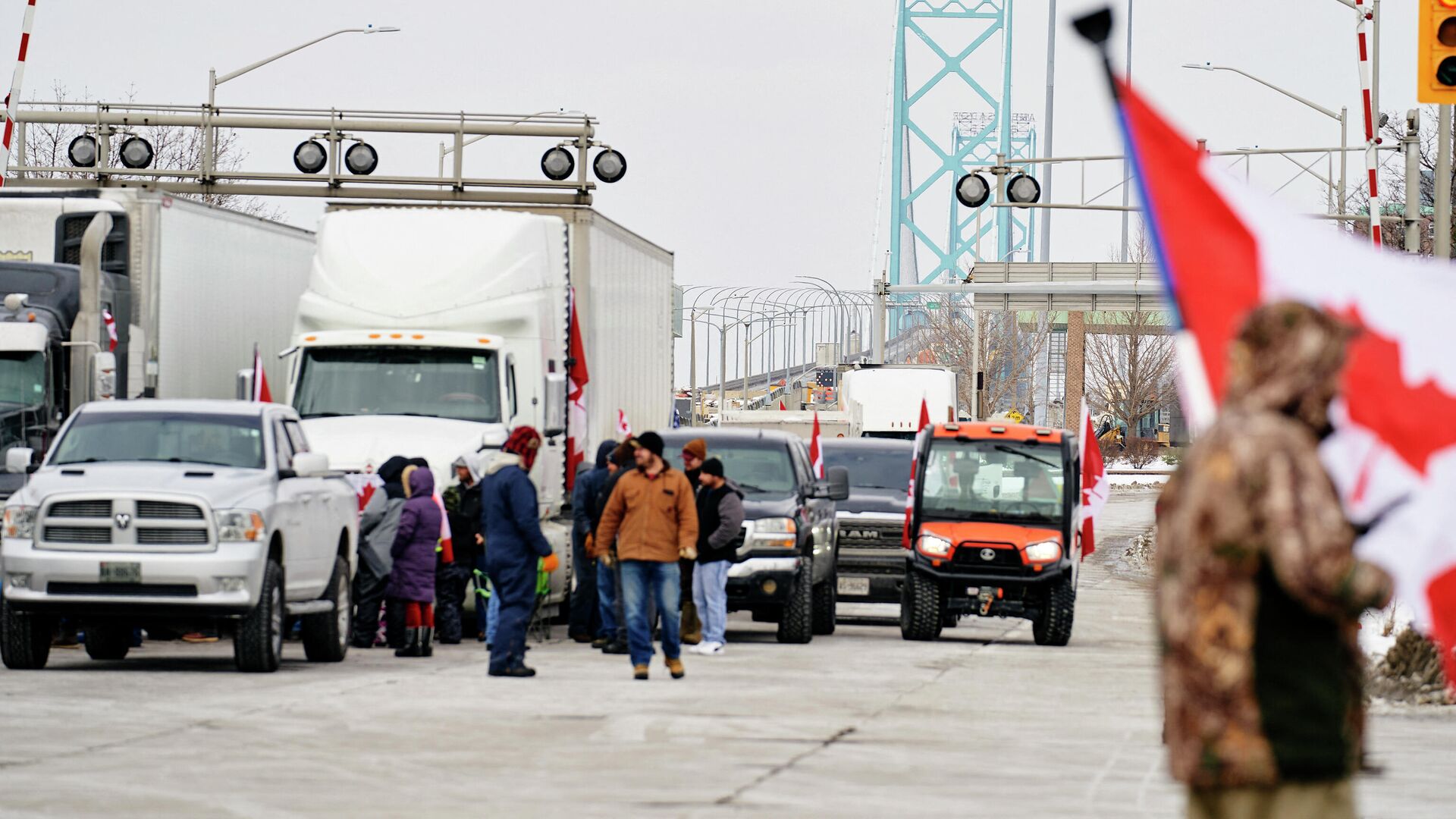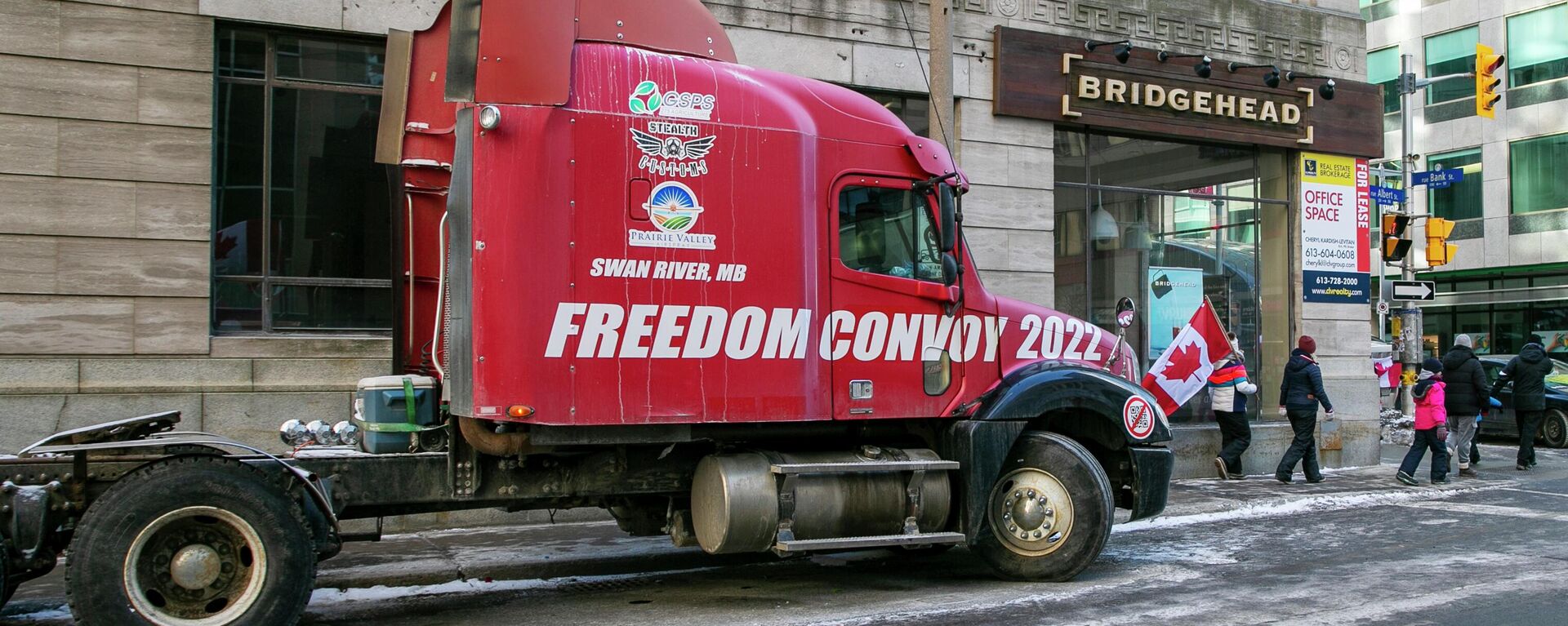https://sputnikglobe.com/20220427/freedom-convoy-closure-of-us-canadian-border-did-not-affect-trade-statistics-canada-shows-1095110196.html
Freedom Convoy Closure of US-Canadian Border Did Not Affect Trade, Statistics Canada Shows
Freedom Convoy Closure of US-Canadian Border Did Not Affect Trade, Statistics Canada Shows
Sputnik International
Canadian Prime Minister Justin Trudeau, after weeks of protests against coronavirus-related restrictions, introduced the first state of emergency law in... 27.04.2022, Sputnik International
2022-04-27T21:41+0000
2022-04-27T21:41+0000
2022-08-06T13:36+0000
world
justin trudeau
state of emergency
trade
protesters
canada
https://cdn1.img.sputnikglobe.com/img/07e6/02/0b/1092946857_0:320:3073:2048_1920x0_80_0_0_6e12814a9bcab172e985df4c7116a44a.jpg
New data shows that the border blockades during protests organized by the Freedom Convoy in Ottawa barely affected cross-border trade, according to Statistics Canada.The figures indicate that trade actually increased compared with the same period in 2021, which calls into question the explanations of Canadian Prime Minister Justin Trudeau, who implemented the Emergencies Act on February 14, citing “threats to (Canada’s) economic security resulting from the impacts of blockades of critical infrastructure, including trade corridors and international border crossings.”The first blockade of a border crossing took place in Coutts, Alberta, resulting in a halt to all traffic at checkpoints to Montana. The Ambassador Bridge border crossing in Ontario was also blocked later, with other blockages at the US border occurring in British Columbia and Manitoba.Meanwhile, trade in perishables such as vegetables rose in February, with Ontario reporting a 7 percent year-over-year increase in turnover. The increase was particularly evident in Alberta, where the number of imported vegetables was up by 66 percent.The turnover of almost all types of goods, with the exception of the automotive trade, increased in February despite the closure of border crossings. The statistics revealed that most of the goods reached their destinations despite various delays caused by the blockades.Nevertheless, Deputy Prime Minister Chrystia Freeland claimed at the time that “the Ambassador Bridge (blockade) has affected about $390-million in trade each day.”Protests in Canada started on January 29 following the implementation of new pandemic rules that allowed only fully vaccinated drivers to cross the border into the US. The rally, joined by truck drivers, quickly turned into a demonstration against COVID-19 restrictions in general. In February, a state of emergency was declared in Ottawa, which had become paralyzed by traffic jams.Trudeau brought into force the emergency law, adopted in 1988, on February 14 for the first time in Canada’s history. He justified the action by referring to the economic damage that the protests had caused.Earlier in the week, Canada initiated a national investigation into the government's use of the Act to examine the circumstances that led to its enactment. The prime minister has appointed Paul S. Rouleau to lead a “Public Order Emergency Commission” to conduct an independent public inquiry and submit its results by February 20, 2023.Liberals have already tried to block some lawsuits over access to documents used by the federal government to justify its emergency measures. Court documents show that in an attempt to keep the documents from the Canadian Constitution Foundation and other civil rights groups, the Liberals invoked “cabinet confidentiality.”
https://sputnikglobe.com/20220419/canadian-freedom-convoy-protest-leader-charged-with-perjury-obstruction-of-justice-1094898702.html
canada
Sputnik International
feedback@sputniknews.com
+74956456601
MIA „Rossiya Segodnya“
2022
News
en_EN
Sputnik International
feedback@sputniknews.com
+74956456601
MIA „Rossiya Segodnya“
Sputnik International
feedback@sputniknews.com
+74956456601
MIA „Rossiya Segodnya“
justin trudeau, state of emergency, trade, protesters, canada
justin trudeau, state of emergency, trade, protesters, canada
Freedom Convoy Closure of US-Canadian Border Did Not Affect Trade, Statistics Canada Shows
21:41 GMT 27.04.2022 (Updated: 13:36 GMT 06.08.2022) Canadian Prime Minister Justin Trudeau, after weeks of protests against coronavirus-related restrictions, introduced the first state of emergency law in February. He claimed that blockades at the borders by the protesters were damaging the economy.
New data shows that the border blockades during protests organized by the Freedom Convoy in Ottawa barely affected cross-border trade, according to
Statistics Canada.
The figures indicate that trade actually increased compared with the same period in 2021, which calls into question the explanations of Canadian Prime Minister Justin Trudeau, who implemented the Emergencies Act on February 14,
citing “threats to (Canada’s) economic security resulting from the impacts of blockades of critical infrastructure, including trade corridors and international border crossings.”
The first blockade of a border crossing took place in Coutts, Alberta, resulting in a halt to all traffic at checkpoints to Montana. The Ambassador Bridge border crossing in Ontario was also blocked later, with other blockages at the US border occurring in British Columbia and Manitoba.
Meanwhile, trade in perishables such as vegetables rose in February, with Ontario reporting a 7 percent year-over-year increase in turnover. The increase was particularly evident in Alberta, where the number of imported vegetables was up by 66 percent.
The turnover of almost all types of goods, with the exception of the automotive trade, increased in February despite the closure of border crossings. The statistics revealed that most of the goods reached their destinations despite various delays caused by the blockades.
Nevertheless, Deputy Prime Minister Chrystia Freeland claimed at the time that “the Ambassador Bridge (blockade) has affected about $390-million in trade each day.”
Protests in Canada started on January 29 following the implementation of new pandemic rules that allowed only fully vaccinated drivers to cross the border into the US. The rally, joined by truck drivers, quickly turned into a
demonstration against COVID-19 restrictions in general. In February, a state of emergency was declared in Ottawa, which had become paralyzed by traffic jams.
Trudeau brought into force the emergency law, adopted in 1988, on February 14 for the first time in Canada’s history. He justified the action by referring to the economic damage that the protests had caused.
Earlier in the week,
Canada initiated a national investigation into the government's use of the Act to examine the circumstances that led to its enactment. The prime minister has appointed Paul S. Rouleau to lead a “Public Order Emergency Commission” to conduct an independent public inquiry and submit its results by February 20, 2023.
Liberals have already tried to block some lawsuits over access to documents used by the federal government to justify its emergency measures. Court documents show that in an attempt to keep the documents from the Canadian Constitution Foundation and other civil rights groups, the Liberals invoked “cabinet confidentiality.”



